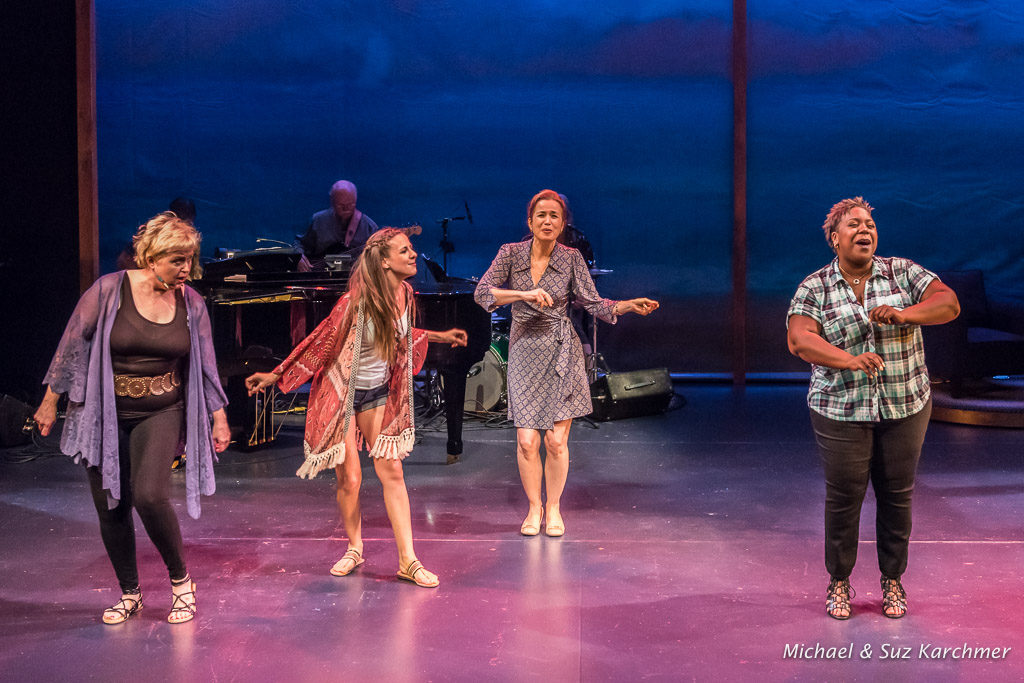So often, music makes all the difference. It not only has those famous savage-breast-soothing charms, it can turn a so-so script into a winner. Take Unexpected Joy, playing through August 20th at the Wellfleet Harbor Actors Theater (WHAT). This world-premiere musical has a nicely topical premise, worked out in formulaic fashion and saved by its songs.
The play takes place on Cape Cod, presumably not far from Provincetown, where a memorial concert is underway for the deceased half of a popular sixties-era duo, Jump and Joy. They were a couple though never officially married, and were long-separated before Jump’s death. Their daughter, Rainbow, rebelled as extremely as possible, changing her name to Rachel, marrying a televangelist and adopting an Oklahoma twang for good measure.
The pious morality Rachel has embraced is about to get an unexpected shock, for Joy is about to marry Lou, who is both female and black. Rachel’s teenage daughter Tamara thinks this is terrific, as she’s been gearing up for her own rebellion, secretly writing and performing non-Christian songs.
The show, smoothly staged by Lynne Taylor-Corbett, opens at the beginning of the concert, with a solo from Joy, then flashes back through the couple of days leading up to it. You can imagine the scenes as they unfold – Joy being coy and evasive when Rachel assumes her daughter’s impending marriage is to a man; Joy being edgy and evasive when Lou asks her when she’s going to tell Rachel the truth; mother-daughter confrontations; lover-lover confrontations; mother-lover confrontations; heart-to-hearts between impulsive youth and benevolent age; angry stormings-off; contrite reunions – and your imagination would be correct.
These scenes are trite when they stick to dialogue, but the songs lift them. Lou and Rachel’s angry duet, “You Are My Worst Nightmare,” is dramatically and musically powerful, as is the cascading grandmother-mother-daughter complaint “I Think I’m Losing My Voice.” Bill Russell’s lyrics are sturdy and occasionally soaring, and Janet Hood’s score is infectiously tuneful, ranging across an inventory of contemporary musical-theater and soft-pop modes, touching on country and gospel along the way.
The four-piece onstage band is led by music director Gillian Berkowitz, who’s also responsible for some of the gorgeous three- and four-part vocal arrangements. Only about half the songs are dramatic moments that move the plot; the others, even when they reflect the characters’ thoughts and relationships, are slotted into the action in the manner of an early-generation jukebox musical, on the lines of “Say, why don’t we practice that new number?”
All four characters are stereotypes, and all four full-throated performers bring them vibrantly to life. Sally Mayes’ pot-smoking Joy is an ageless flower child, still elated by life’s unexpected adventures. Lacretta, as Lou, makes a spiky contrast to her hippie-throwback fiancée – a no-nonsense black woman with a zesty wit and spicy tongue (she never actually says “Hey-ll no!” but you keep expecting her to).
Charity Farrell is wide-eyed Tamara, wriggling free of Oklahoma and reaching eagerly for Outer Cape nonconformity. Oddly perhaps, I felt most sympathy for Michelle Duffy’s Rachel, the happily obedient preacher’s wife who insists she doesn’t hate those homosexual sinners, who can’t even consent to sing at Jump’s memorial because he and Joy were never properly married. Of the four women, she’s the most complex and conflicted, the one who makes the longest emotional journey in the 90-minute evening, and for me, the most interesting.
After its bumpy, predictable ride, the show ends in reconciliation and song. And that’s the power of music. Encouraged and often moved by the musical numbers, I was gradually charmed till, in the finale celebrating “Common Ground,” I was blinking away an admiring tear.
If you’d like to be notified of future posts, email StageStruck@crocker.com



